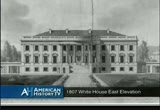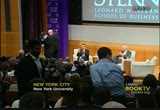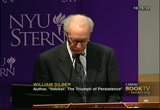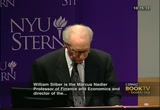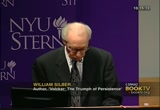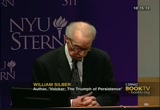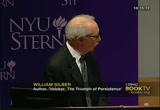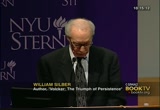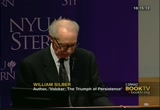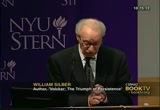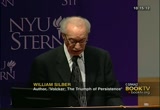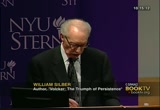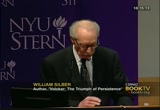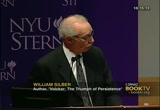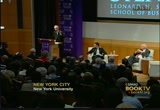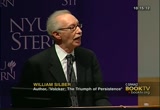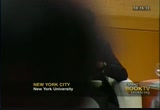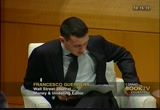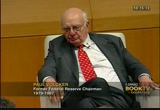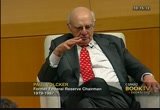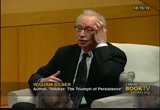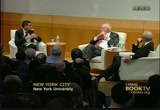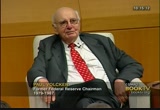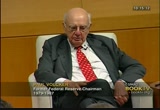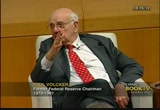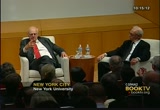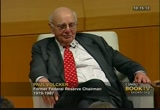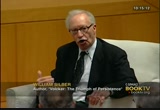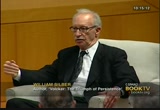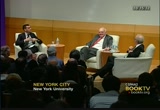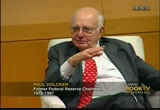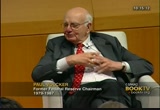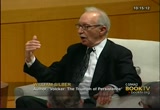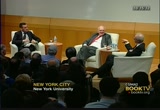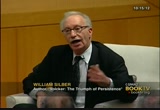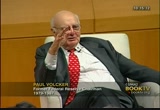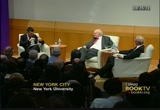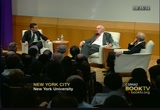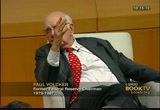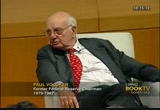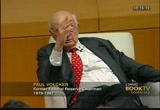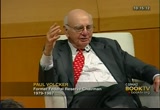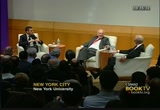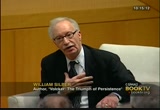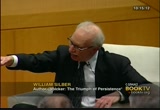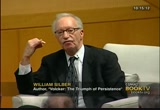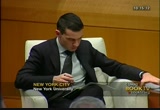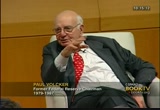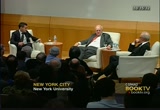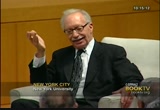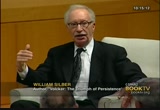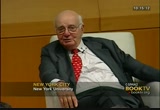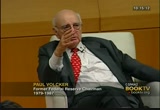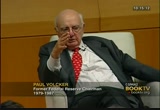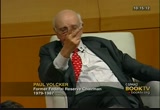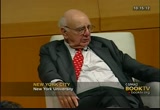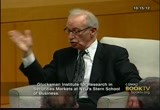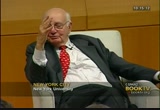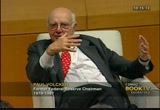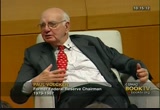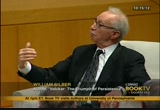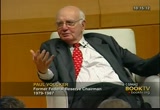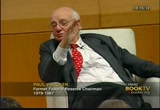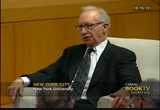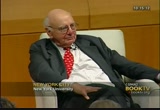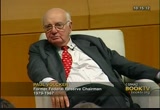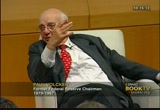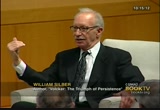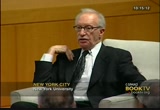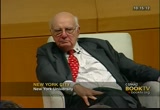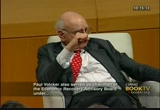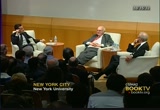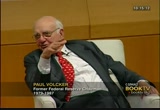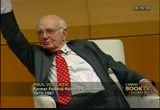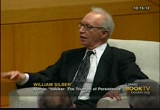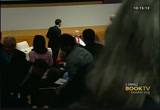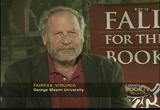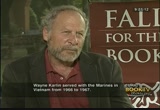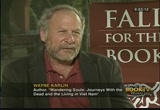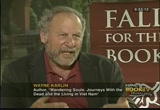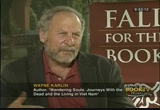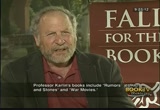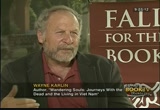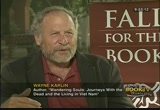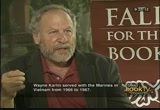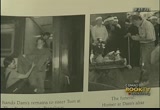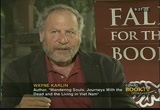tv Book TV CSPAN December 16, 2012 10:30am-12:00pm EST
10:30 am
fe. so if you're going through the valley, it's called the low road to taos. and that place in northern new mexico has the highest rate of heroin addiction and death from overdose of heroin of anywhere in the country. and has for a long time. and the problem is not getting better, it's getting worse. >> you can watch this and other programs online at booktv.org. >> the white house was very controversial as most things in america were. it was not particularly awe-inspiring. neither large, nor
10:31 am
awe-inspiring. but the answer the congressman gave said the purpose, if it were larger and more elegant, perhaps some president would be inclined to become its permanent resident. >> vicki goldberg has gathered a few of her favorite white house photos. watch tonight at 7:30 eastern and pacific on c-span3's american history the. tv. >> next, william silver and former federal reserve chairman paul volcker talk about mr. volcker's life and years of government service. it's about an hour and a half. [applause] >> that was very nice. you didn't tell me there were so
10:32 am
many people here. so i have a sneaky suspicion that you're not here just to listen to me, so i'm going to be very brief, 13 minutes on a 300-page book. and i'm going to give you some background, and i'm going to give you some substance. the background starts with the title of the book. the title of the book is the first thing you see, but it's the last thing that we do, and when we put our heads together at bloomsbury press to create a title for this book, we thought about a number of alternatives. in a shameless attempt to capitalize on the volcker rule, i tried the semi-biblical volcker know thy enemy. [laughter] now, that was rejected as too narrow. i mean, how many commercial bankers are there? fewer than before, we know that. someone else suggested a much
10:33 am
more expansive volcker rules. [laughter] and now that was cute, and the knell on my left, the -- the fellow on my left, the tall one, he loved it. [laughter] but it was knocked out because as the poet said too cute ain't cute. so instead we took the title, "the triumph of persistence," and that's was that describes how paul volcker did what he did. in researching this book i had access to both the personal and professional sides of paul volcker. he dumped into my lap the entire contents of a walk-in closet in his apartment. [laughter] including the elementary school report cards that had been carefully preserved by his mother. he also authorized my reviewing his extensive fed correspondence held in the archives of the federal reserve bank of new york. the fed did not like that one
10:34 am
bit. [laughter] federal reserve makes the cia look like publicity hounds. and finally, he sat for over a hundred hours of interviews with me, and i'm sure you can guess it was not always happily. so now let me turn to something of substance. this book is really two stories in one. this story is about a man who served under five presidents battling the three greatest financial crises of the last half century, but it's really a story about trust. and what i'm going to do is, first, tell you a little bit about the crises and then go to the underlying theme. crisis number one is gold. on august 15, 1971, some of you may remember that president nixon severed the dollar and gold by suspending foreign central banks' rights to
10:35 am
10:36 am
20% on commercial loans. both are modern records that still stand, and crisis number three is, of course, the world financial crier sis that began -- crisis that began in 2007 and is still with us. let me just say that the volcker rule label was announced to the press by president obama in january of 2010, caught paul volcker by surprise. not the rule, but the label. in fact, when he heard the president announce his name, he thought to himself: now, why did he do that? and that's why i say my favorite phrase in this book describing paul volcker is the man who could find fault with the mona lisa. [laughter] paul volcker made a living saying no. he said no to gold in 1971, he said to to inflation in 1979, and he said to to commercial
10:37 am
bank speculation in 2010. but the underlying theme, the underlying storyline is trust which, by the way, is the title of the last chapter of book. it is six pages. you can go directly there, and you can skip all the stories if you want. when president obama appointed him, chairman of the president's economic recovery advisory board, prab, wrote paul volcker a three-word letter. that letter still sits in a chrome frame on his desk. it says: we trust you. and in this book i show how paul volcker earned that trust and follow up with the lessons. and i'm going to start at the beginning. paul volcker learned about trust as a child. his father, paul volcker sr.,
10:38 am
was the town manager of -- [inaudible] new jersey from 1930-1950, and he had a quotation from george washington hanging in a frame behind his desk. it's an obscure quote from a letter george washington wrote to his officers who at the time were getting applications from other people to be officers. and the quote says: do not suffer your good nature to say yes when you ought to say no. remember that it is a public and not a private cause that will be injured or benefited by your choice. that quote worked it way into paul volcker's brain, and he's been saying no ever since. [laughter] paul volcker is known today for the volcker rule, but he earned the trust that easy anonymous
10:39 am
with his name and defeating an inflation that almost destroyed the american financial system. why is he obsessed with the financial system? he is fond of blaming his mother just like the rest of us for all of our obsessions. and i say he has to stand in line for -- [inaudible] because she refused to give him an increase in his allowance at the end of world war ii in 1945 when he was leaving to go to princeton to.
10:41 am
>> ultimately controlled inflation. the process began. by 1982 inflation was 4%. but the final victory certainly before interest rates came only after congress passed a balanced budget amendment in 1985. it was called the graham-rudman-hollings bill that imposed draconian cuts in government spending unless the government, unless congress passed a balanced budget. does that sound familiar? it's almost like what we have now. senator warren rudman, one of the sponsors of the bill, said it was a bad idea whose time had
10:42 am
come. and yet only after graham-rudman-hollings was passed did long-term interest rates decline below the 10% level that they had remained above throughout paul volcker's first six years at the head of the central bank. what triggered this unprecedented legislation? more than a year before graham-rudman-hollings was passed, senator john hines, the late senator john hines who was killed in an airplane crash a few years ago uncovered a hidden agenda in paul volcker's plan during senate banking committee hearings. this is so important, i'm going to reenact the conversation. [laughter] ready? hines says, mr. chairman, we've agreed that the deficit bad, but if my experiences in congress is
10:43 am
anything to go by, there's going to have to be a crisis in order to fix it. and my question is, are you prepared to bring about the necessary crisis through your continued restrictive monetary policy? paul volcker could hardly believe his ears. i mean, what is this? to avoid a political suicide by the fed, he answers -- i'm not going to try to do him. he can imitate himself better than i can. so all i'm going to say is as a matter of general -- this is what he says -- as a matter of general philosophical approach, and i feel very strongly about this, it's not our job to artificially provoke a crisis. so hines appears to back off when he says, mr. chairman, i never intimated that that, in fact, was what was part of your thinking. and paul volcker deadpans, well, i wasn't absolutely, positively sure about that.
10:44 am
and then hines comes back and says, but it might be an inevitable consequence of your tight monetary policy. paul volcker, like george washington, can't tell a lie. and he says, all right. and the all right response, in fact, confirmed the hidden agenda. what was the hidden agenda? to maintain painfully-high interest rates, to convince congress to curtail the budget deficit so that monetary policy could eventually ease up. the day after the bill just as final confirmation, the day after the bill was passed senator phil graham, who was the architect of the balanced budget amendment, called paul volcker and says, okay, now that we have the budget under control, do you think we can have an easier monetary policy? and volcker answers, we'll see. now, that's a typical central banker's response.
10:45 am
and that brings me, of course, to today and the immediate future. the current full employment budget deficit is about 5% of gnp. 5% of national economic activity. it is a number that is eerily similar to the reagan era budget deficits. and ben bernanke is going to need lots of help in engineering an economic recovery without inflation. the volcker fed raised interest rates after years of inflation had garnered public support for tight monetary policy. but right now after years of recession and unemployment, the federal reserve may encounter hot of resistance -- lots of resistance if it has to act preemptively which is the only way it can do it. and it is, therefore, crucial that congress and the president embark on a plan to balance the full employment budget.
10:46 am
as it did in the late 1980s and in the 1990s. only then can we really trust that the federal reserve will act irresponsibly. i'm sorry to end on such a sad note, but that's it. francesco, it's up to you to rescue us with some on the nhl. -- optimism. >> no question. thank you, bill. [applause] >> ready? sound like a good book? sounds like a good book, doesn't it? >> it is a good book. i read it twice, and i can tell you it's a good book. if bill thinks, suspects that you had to hear just from him, i am positive you will hear from him. so i'll tell you just a couple of things, and then we'll go straight into the discussion. the book the terrific for two reasons. one is paul volcker is a terrific subject and historic
10:47 am
figure that has struggled more than 40 years, and also there's -- [inaudible] and take it from a writer, we have a terrific writer. it's concise, witty, very breezy writer. i read business books for a living, and it's tough. this is not tough. [laughter] so with that said, we're going to have a half an hour conversation among ourselves, and then we'll want to hear from you. so the way we're going to do is is there are going to be people going up and down the aisle only twice, and you have to hand over your question cards to them. the book, the questions in the mind of any contemporary reader will be are there any lessons from the volcker eras -- i say
10:48 am
eras, no era -- in the present situation? today we're fighting, clearly, a different evil. we're fighting unemployment and not inflation, at least at the moment, yet we're having some to have same conditions. a huge budget deficit that we need to solve. is the solution higher interest rates? >> let me answer the question, but let me say, first of all, how happy i am that i'm old enough to have read this book. [laughter] you know, after the '80s it wasn't just a phenomenon in the united states, but inflation was very high around the world but particularly in the united states with our responsibilities for world currency. and people rather thought this was a problem that ought to be dealt with, but by the end of the decade, they thought it could be dealt with, and central banking became poppe around at the time -- popular at the time
10:49 am
because central banks were going to be the guardian of price stability. that's 20 years ago. but there was this glorious period of central banking. now we face this huge financial crisis, very big recession, lingering recession. so all the emphasis is on expansion. there's no inflation at the moment with all that's going on. but it does raise the question whether in this necessary understandable wish to push money out into the system and get the economy going again, will we lose sight of the lesson that we learned with some difficulty in the '70s and 1980s? sure hope not. but i am very clear -- very glad when i hear the federal reserve say as they say repeatedly, they're taking more and more -- [inaudible] but they always stick on the end of their statements, but we want to do it all in the context of price stability. and i'm glad to hear them kind of repeat that mantra.
10:50 am
and hope that it will be acted upon when the time comes to act, which isn't right now. >> you mentioned in your opening statement that the fed has acted slightly preemptively if it's going to work, so when will that be the time to act? >> so i'm not sure that anybody should take from what i said that the fed should tighten now. i didn't say that. and i don't think they should. unless the unemployment rate starts to really come down even faster or than it's already seeming to be coming down. but i think you have to worry about price stability. price stability is easy to say and hard to do like diet and exercise. they're easy to say and hard to do. [laughter] and one of the things that paul volcker taught us is that the big mistake that was made in the
10:51 am
'70s and not in the '80s, in the '70s was renaming too easy for -- remaining too easy for too long. and he was criticized not in 1980, not so much in '82, in 1985 when the unemployment rate was 7.5%, and the fed tightened up because it was being preemptive. i worry whether ben bernanke or whoever follows him will, in fact, be able to preemptively raise rates when we have a legacy of five years of unemployment. the fed is independent but not independent to congress. >> and in this context one of the, i guess one of the threads of the book which should have been called, really, volcker rules -- i would have voted for that. [laughter] >> he wanted to pay extra for volcker rules. >> yeah. i think it would have been money well spent. one of the issues is it shows
10:52 am
the power of central banks when properly used to influence economic activity. i guess the question facing a lot of central banks today which i'm sure you faced throughout -- [inaudible] have the central banks done too much to compensate for a political arena where nothing or very little has been done on the -- [inaudible] >> done too much three years there now. i don't think we can tell right now. we are in a situation we haven't faced since the 1930s, and the lesson that was driven home to many economists who grew up in post-world war ii world was that the great mistake was made in the 1930s with a long recession and long unemployment as the federal reserve gave up -- well, they were too late to ease and too early the tighten. under those particular circumstances. i hope that lesson isn't so
10:53 am
embedded that they forget to tighten in time when that will inevitably become down the road, but it's not here right now. and you can argue about these recent moves. i do think, you know, the traditional power ors of the federal reserve -- powers of the federal reserve have been exhausted. they may have one or two little things left in their tool box, but nothing dramatic. so here we are, we have to rely on other policy measures, have to rely on the return of the so-called animal spirit sometime to get the economy going again. but we are in a situation, we have been in, since the 1930s of a great financial expansion in the late 1920s and here in the early part of this century and great bust in the stock market, now in the housing market. it happened in ya -- japan where they had a bust both in the stock market and the housing
10:54 am
market, and they still haven't recovered fully. and we've got europe, and they've got their own excesses. and the real lesson here is not so much inflation at the moment, but how did we ever let these excesses of housing here, housing in spain, housing elsewhere, in ireland, in this japan earlier -- in japan earlier, remember those days when you used to talk about the property around the imperial palace in tokyo, and a few hundred acres was equal to the value of all the real estate in california. now, that was real -- i don't know if it was true, but each to talk about -- but even to talk about it was a sense of how extremely -- [inaudible] >> do you share the, when you talk to fed officials, do you share -- >> i'm off the record here? >> no, not now. [laughter] no, no, you're fully mic'd.
10:55 am
[laughter] when i talk to a fed official up there because happens to be power within the cia, um, they reveal and betray certain kind of frustration with the criticism they've been subjected including the criticism that they're easing too much because they say, well, that was the only course of action. we couldn't have done anything else in the face of a pretty -- political class. do you share that? >> well, they got it in both directions, and, you know, i don't think you should just act because you're getting a lot of criticism and people are impatient. but if you really think you can accomplish something, you act. now, they get a lot of criticism, it just happened to be in the papers in the last few days for so-called emerging countries that somehow easing measures that the federal reserve is striking is somehow undermining unfairly prospects for the developing world.
10:56 am
we have a responsibility for importing for them, that somehow we are hampering and that that criticism just seems to me -- i don't understand it. it's pretty wild that somehow we should tighten up in the united states to help ourself. it's a little far-fetched in terms of the cause and effect. and i agree with what i guess chairman bernanke was saying the other day, that what he's doing is not aimed at emerging countries as some of them are saying. it's aimed for policies to create a recovery in the united states which in the long run will help everybody. >> yeah. >> he's got to do that consistent with stability in the dollar, and that's the, that's the tricky part. >> you know, believe it or not, he sounds too nice. i mean, he doesn't want to criticize ben bernanke or really --
10:57 am
>> secretly, but i just think -- [laughter] >> he's really a nice guy despite all the -- [inaudible] and what i think is important -- >> this guy wrote a book. >> it is. more than one. >> i'm starting the second book right now. >> i want to buy the first one. >> so it's not, you know, we fiscal stimulus, and we should have had fiscal stimulus. you need unemployment insurance because you need to bolster spending, but you also need long-term budget balance. if there is one lesson that comes out of the 1980s is that you can't have responsible monetary policy without responsible fiscal policy. it's too hard. politically, it's too hard. this is not a question of can you control the money supply. you can control the money supply, but can you take the heat that congress will, in
10:58 am
fact, call the chairman and say what are you raising interest rates now, we just had unemployment. you're trying to nip the recovery in the bud. and, you know, this is -- when it comes to inflation, and he knows this better than i do, you can't until you see the whites of their eyes. it doesn't work. you have to nip inflation beforehand. and i'm afraid that when ben bernanke says, well, there's no other game in town because fiscal stimulus is not there, i'm going to push out the money supply. don't worry, we'll take care of it later. i say, again, that's easy to say and very, very hard to do. it's going to be very difficult for ben bernanke or whoever is the fed chairman if it's a problem. it's not a problem right now. twelve months from now or 18 months from you you get a recovery going with the kind of deficit that we have outstanding
10:59 am
and with the kind of liquidity that's sitting in the banking system, i want to see a fed chairman then raise interest rates. and i'm not talking about, yeah, we'll go from 1.6 on a long-term bond to 2.1. how about from 1.6 to 4. because you're not going to get anybody's attention in any other way. and that is really, it's a political problem. this is not an economic problem. this is a political problem. and the two issues -- monetary policy and fiscal policy -- can't be separated. tsa what he told -- that's what he told senator hines. >> shall we put silber in office? [laughter] [applause] >> well, there you go. why do you think i wrote this book? [laughter] >> so it's a start of his political campaign. it's the start of his political campaign. [laughter] >> he hasn't told me about that
11:00 am
before. >> he has an agenda. >> are you ready, are you ready to be the chairman again? >> no. i'm sitting here, i'm a little old for that. [laughter] you're a young man, vigorous. [laughter] >> okay. fair enough. but on the other hand, what you're pinpointing that you see throughout the book is that's a structural program. the issue you just raised is a structural problem. it always happens. it's very difficult to find a time -- >> difficult to balance, it's equally difficult to get the fiscal side in shape. >> right. ..
11:01 am
>> first of all, i'll ask mr. volcker, if that was the agenda, if that's what he wanted to do. >> i was thinking i'll wasn't strong-arming anybody. you did what you thought was necessary and appropriate under the circumstances. once you got underway with this policy you weren't going to give up. i can't say as i had any great faith the congress would act decisively. you just proceeded along. >> i'm going to jump in. let me just tell you when i
11:02 am
started to write this book, this wasn't even on the agenda. it was not something that was part of this book. because i didn't go about it. the only way i found out about it is by reading the documents, the contemporary documents. by reading the interchange between him and senator heinz. and say that was sort of public consumption. then you read the minutes of the federal open market committee. one of the people on the federal open market committee was developed by the name of jerry who was the protége of paul volcker, and he said if we don't raise interest rates, the chances of getting any help from the fiscal side is almost zero. so i've got to say that if you read what the federal reserve system was saying behind closed doors, and by the way, back then nobody expected the minustah be
11:03 am
published because they weren't published until 1893. this is unfiltered conversation. they were very clear -- >> conversation. >> yeah. what do you want me to lie on? >> just what i remember back then. conversation that was going on. >> we had this argument. the story was, though, i found this quotation someplace and that's a temporary record. you have to go with temporary record. and he said you don't know the context in which that guy was thinking. he was saying the opposite of what he really meant, i know that. [laughter] >> do you want me to say what reminded -- he reminded me, by the way, after the book, he didn't read the book until it was already went to press. and called me up afterwards and said he made a big mistake.
11:04 am
that's the truth. he calls me up, he made a mistake. you got my resignation wrong. resignation wrong? that was very important because i had this whole story about what happened with the foreign-exchange. foreign-exchange collapsed and gold went up. you got it all wrong. what the munich at all wrong? i re-signed monday afternoon. you said i re-signed tuesday morning. [laughter] so i was sweating it. the book was already out, it's too late. it was gone, you know? so what happened is, well, let me check before i go, and i look at president reagan's diaries. president reagan's diaries? that's not such a bad source to look at. and, of course, president reagan says -- >> he wasn't the most reliable. [laughter]
11:05 am
>> this is his diary. and then the diary it said, guess what? we are going have the announcement tuesday morning. i call him back and i said wow, maybe that was one thing that i forgot about. well, i think contemporary records have their place. >> i am hopeful that we can resolve this discussion in the next two minutes. i am hopeful. are you saying that that's what happened, the fiscal responsibility of the u.s. government eventually embraced was just an unintended consequence of a policy? >> no. this was a long time ago and i don't remember all that. who knows what our stinking at that point? my memory, you know, pretty tight policy at a time when the economy was -- [inaudible] but
11:06 am
it was still high unemployment. and i didn't have any idea congress is going to act. i think the fact that interest rates were so high probably, and then getting together and trying to take this gramm-rudman thing for how effective that was is another question. it was effective for a very, very short period. the high interest rates probably had something to do with it, but it wouldn't have directed me. it would have been suicidal. >> right. that's as much consensus as we're going to get on that. i feel. spent it sounded like we agreed perfectly. >> let's talk about the volcker rule before you move on to the questions from the audience. unit going to get many christmas
11:07 am
cards on this. spin you would be surprised the number of bankers that agree with me. they were very -- some very important once. >> publicly? >> well, you know, publicly occasionally. i saw a bank or the other day -- philosophically i agree with the volcker rule. >> the retired ones i agree with them. >> i want to ask you, one of the things you hear when they talk about the rule is it has nothing to do with the crisis. it had nothing to do with the crisis. >> the answer is that's wrong. [laughter] >> that's a good answer. >> you can look at all outcome of the crisis, there were a lot
11:08 am
of -- one point of view, i've been told, is the banks lost as much money on trading as they earned the previous 12 months, and that had nothing to do with the crisis is not reasonable. you know all the individual cases during this period of crisis we had losses of five, $10 million, from individual saviors. but the important thing about this for me was to overlook not just the risk involved, which israel, -- is real, but this trading policy, all the financial engineering and so forth, that that is the culture of the banking generally so alas good behavior patterns were simply inconsistent with stability. the biggest single factor in
11:09 am
this balloon of course was housing. but how do you have all the subprime mortgages, easily sold, people manipulating them and selling them, kind of trading itself. [inaudible] people out there making mortgages are supposed to the most conservative political bankers in the world. suddenly became the highest, and through it all off. >> why not just split the banks? >> securitized at all, may $200 every time they put together a lousy mortgage. i have never argued the risks
11:10 am
itself was because of all the crisis. but could contribute to the cultural atmosphere. biggest problem the banks made, they made too many bad loans on real estate, not just banks but others. this was a major factor, but they contributed to the kind of behavior. >> and why not in in corporate glass-steagall? completely ban the commercial banks from doing -- why not do that? >> you could. i didn't think that was the way to solve the crisis. when you look at the so-called -- in the uk and now a new report by the european commission to, they propose something that smells like glass-steagall. with a difference. they say let's separate all those activities, use the same
11:11 am
language about proprietary activity and trading and all the rest, and they say but let's keep it in same holding company. but we will separate the banking subsidiaries from the investment banking subsidiary, and will put all the trading, more than i would, in this subsidiary, or all these underwriting, although lending come all the prime growth, lending to hedge funds and property funds. let's see cluster them in a separate subsidiary and will have this other security that is for commercial banks. now when i see this i wonder why didn't they take the final step and say no, that's going to be a separate company. because it's very hard -- and say that they are not related and independent. they immediately run into
11:12 am
problems. may run into problems. what transaction will exist between the investment bank and retail bank? you've got to permit more and more. you've got a choice, but we're both looking at the same -- they used the same language when they discuss as to what it does to the environment. what risk does agree, what's it doing to the culture? so let's separate them all. in a way they are more draconian than i am. so we will see what happens. >> bill, you're one of the leading experts on the volcker rule, because you told me -- [laughter] and we disgusted. >> you wrote a very nice article about it. >> yes, i did. >> i liked it. >> i guess the commission is, how you did things between proprietary trading of speculation. you have a terrific, and --
11:13 am
terrific argument in the book, secondhand car salesman which is possibly something that -- >> that's meant as a pejorative or he. why don't you get rid of this? >> he came to me and said, you know, so i had this proprietary trading, want to get rid of proprietary trading. i said why do you want to do that? and why don't we just increase the capital of banks? and that, larry summers who was a smart economist said just raise capital high enough, and i'll tell you, if i believe that you could raise capital of banks high enough and they couldn't circumvent those regulations, then that's enough. but we've seen it time and again. if you give them an opportunity, give them capital requirements,
11:14 am
they set up subsidiaries and so and so forth, so in that sense you want to have another dimension to the other dimension might be suppressed whatever extra risks you can. the only input that i had in this process was that the claim that you can't tell the difference between proprietary trading and market making, that's just not true. you can. every manager of every trading desk at every bank, and that every investment bank, does that for a living. every manager of every trading desk sits there and says, hey, you, down at the end, why are you holding that security for the past week or two? what do you think you'd asking them? you're holding it because you're
11:15 am
speculating. get rid of it. that's their job. so they do it 100%, absolutely in the. nothing is 100%. nothing is 100%, but if you force bank managers to say the ceo of the bank is going to have to testify that there's no financial institution, there's no speculation, otherwise he's going to spend 10 years in jail, i guarantee you there won't be any speculation. i guarantee you. obviously i'm not proposing that. don't like that. [laughter] >> i didn't say that. i said you can tell and you could make it happen if you really want to. do you really want to ?-que?-que x first of all, it's the law of the land. and there is a role given the imperfection in capital requirement. capital requirements can be circumvented and they have been. >> you have the same problem.
11:16 am
>> that was very good. you done a terrific job i think. [inaudible] when the banker says raise capital requirements he's thinking not come up by 1%. if you want them up you jack them up by 20%. >> will now move to the questions. i want to stress, excitement that you, you cannot tell, you can tell there's a key argument of proponents of the volcker rule. i recommend to read that. it lays out very clearly on my article on that which is also clear about that. >> the same thing. >> the same thing. but let's hear from you.
11:17 am
there's questions you. really -- in the election season, we heard that ron paul, friend of the fed, talking about bring the gold standard back. your thoughts? >> no. [laughter] i don't think that's coming in, on anybody's real agenda. may be on ron paul's agenda. ron paul and i get on personally okay. >> he thinks you are the height of integrity. >> i wrote an essay on gold and a process which i recommend. a terrific book. the new edition has come out. but the point of legacy he is a -- the gold standard will be effective, you've got to fix the
11:18 am
price of gold. you've got to stick to it. through thick and thin. and two things that after we went off called a couple times the last century or so, somebody is really going to stick through thick and thin. i think you get in trouble you go off. then the gold standard is nothing. [inaudible] you have to replace all the dollars out there with gold, the price of gold would have to be enormous. who thinks that would be maintained? >> there's a question right thing both of you, which is a deeply the large-scale asset purchases are accepted? and he said, to what channel? a question about -- they're asking whether large scale asset purchases are effective and which assets to you by? >> i can't comment on that. as i said, success of efforts,
11:19 am
qe1, qe2. some of this stuff is not new stuff. it goes back to the '60s. not very effective. but i think these are, you know, kind of extreme measures because the straightforward central banking have lost their effectiveness. they've gone as far as they can go. it's a difference of opinion of how effective they were. but nobody thinks they're going to be -- there's nothing magic in those actions, in my view, of producing -- [inaudible] >> i think qe2 should have stayed as the name of a boat. [laughter] i mean, i -- look, you talk about qe2, qe3, there's nothing more than open market operations. which have been around for the
11:20 am
longest time. they go out and they by securities. they buy mortgages security. now the focus is not so much on the open market purchases which give reserves to banks that allow them to lend back. it's more on they are going to buy mortgage-backed securities. they will push up the price, and directly lower the interest rate. well, the thought, do you think the problem today is that interest rates are too high? i don't think that's the problem today. i think the biggest problem today is we have 20 years of excessive leverage. that's what brought the financial crisis, leverage, leverage, leverage. leverage kills, likes details. if the prices go in the wrong direction. you're not going to be able to fix up the legacy of excess leverage and the reticence that
11:21 am
people have about spending because of that, by lowering the interest rates from 1.7% to 1.5%. it's a process that has to take time. and what i'm afraid is that we keep on pushing out qe2, qe3 and qe four, you are leaving a huge puddle of liquidity out there that's going to have to be pulled back at a time when nobody is ready to go back. >> what we're banking on is the stimulus like stock prices. will be a kind of mechanism, but the risk is you promote speculative activity that may complicate a problems down the road. >> there's a question about i guess that too big to fail
11:22 am
problem. the u.s. has occasionally failed out entities. and, of course, the most recently, most recently by the lehman brothers and bear stearns. other times when i think of her under what circumstances did bailouts make sense of? >> too big to fail or what to do about it, this is a more important, and even the volcker rule. i know we are in the heart of things. [inaudible] because they feel protected they take the risk. there's no doubt that they were protected on a grand scale during the crisis. even stockholders were being protected. very few cases were stockholders wipeout. so this is a big problem everyone is concerned about. and what do you do about it? and there hasn't been enough attention on this.
11:23 am
dodd-frank bill has a section that says in the future no failing significant financial institution will be saved in the sense of the management and the stockholders remaining, particularly -- [inaudible] be put at risk. but how they going to do that? you have to override the normal bankruptcy laws, and they said the government, in this case the united states, which they already do for small banks, can step in. they will if they want provide enough financing to keep the institution going and having them meet the requirements on the financial side. the stockholders are going to the credit for getting money depends on the final disposition. at that institution would
11:24 am
liquidate. how they liquidate it might be in fact liquidated over time, or selling it off in whole or more likely in pieces. there's horrible approaches to make it practical. it's not going to work in practice. so work in progress. it won't be work in practice unless there is agreement internationally because you're dealing with a big international bank. let's say it's an american bank. you cannot do without just in the united states. and the real critical thing, you're the big financial market, -- [inaudible]. it's remarkable. it's not generally known sitting on some committee were we are hearing about. there's a lot of technical stuff
11:25 am
going on between the uk and the united states. i'm not sure it's in uk law but they don't put it in law. and now, state of new york, resolution authority. so you get some consistency around the world. and i have anything that it will work for nonbank. whether it works for the biggest banks in the world, the first part is -- [inaudible]. they are so diverse and so big, it will be a long while before we see this infinite failure. but i think theoretically -- [inaudible] but it would have worked for leave and. it would have worked for aig.
11:26 am
i have no doubt in my mind we could have handled it. >> so what is your thought speak with the problem is beyond my pay grade. this is a really big problem, how we deal with the too big to fail problem, and the man on my right says he would do with it too big to fail problem with the content bank in ellicott and that was bailed out. that was not his first too big to fill problem. the too big to fill problem occurred before the. there were cries for loans and lockheed loans, and i argued in 1914, treasury secretary magnitude bill that new york city because they couldn't pay their loved. so it goes back a long time, too big to fail. and i think you've got to get this resolution authority so
11:27 am
that institutions that failed can separate out the key functions. this is something that is really easy today and our to do. so i do have a solution, and i'm glad that he is on the committee and not me. >> we have a question on europe. do you agree come you both, do you agree with angela merkel's insistence on austerity for greece, spain and italy? >> austerity, yes. the definition of how much. but there's no way you can deal with that problem without a substantial degree of austerity in cases where they have excesses and bubbles and various parts of the economy and
11:28 am
deficiencies. you can't sustainably bail them out without basically quid pro quo. on the other hand, let me say you can expect them to maintain austerity and less they're going to get -- that there will be some action. or within a definite period. and this is where kind of the rubber meets the road. everybody i think understands that, let's not call austerity, but you need very discipline policy by the borrower. unity willingness to lend on a part of the creditors. accreditors don't quite trust the borrower's. the borrowers don't quite trust the creditors that they will provide the money. so they don't do this on a grand scale. they do it, comes to kind of a, they differ too much. say, we'll go in for another three months.
11:29 am
then a few months later they come to another block in the road, although more discipline, a little more money. the central bank is, european central bank is kind of small targets and we will provide the money. when push comes to shove, much more interesting thing than what -- behind all this i believe there is kind of an enormous sense of commitment, partly for political reason to maintain the euro. probably just on the part of the general public. i mean, they almost, after 10 years, can't imagine. can you imagine -- [inaudible] and what would happen to it? nobody thinks that would be a very happy thing. so there is a kind of -- i think
11:30 am
understandable and right. conviction that we're going to try to hold this thing together. >> another argument is -- you effectively kick them while they're down. spirit look, austerity is something that, you know, easy for the other guys to do. i understand that. but the problem in the european union is that there is only one dimension of union, and that is monetary union as opposed to fiscal union. and i think what's happened in greece, in spain, is that they benefited from low interest rates because of their reunion, and that meant that they allowed their fiscal policies to get out of line. so it's sort of just the reverse
11:31 am
of the problem that we had here that we have here, which was okay, we can raise rates and cut them back. here, rates came down. so the discipline that would naturally occur disappeared when you have a union. >> i thought you at a different point. greece and spain and so forth, could borrow at german interest rates and they went kind of wild. the good old united states of america, we rent historically big deficits. we consumed without settling them. how is this all possible? because the chinese were happily loaning us money at very low interest rates. substitute the words the united states and greece, and china to germany and you have a world scale, the problem in the united states. the problem in the whole world.
11:32 am
but let me just, following those comments, you know, you've got a single moment. [inaudible] decided to they want more unity or less. because the euro cannot survive unless they have more sense of some kind of central control. more sense of discipline before the crisis. which means some kind of limits on fiscal policy, but one thing, but it goes on fiscal policy. spain had a pretty good fiscal policy. they kept borrowing money to build houses. so we've got to have some kind of oversight of economic policy as part of the price of being in the union. they wanted -- [inaudible]
11:33 am
monetary union without the economic union. doesn't work. so the proposals are out there, and i think they basically want to move towards more economic union. a lot of debate, a lot of reluctance. i think they're going to do in the end but this is something you can do overnight. but the fact they're willing to look at is absolutely crucially important. >> part of the reason that china lengths to us, the rest of the world lends to us, is that historically we have shown fiscal discipline. so, you know, as soon as we waiver, that's when the problem will emerge. so i just come back and say we
11:34 am
need to make sure that we have long-term fiscal discipline, otherwise at some point the chinese are going to say why are we holding these green pieces of paper for a long time? not green, because it's electronic, ma but still, what are we holding them for? i say you still are benefiting from the 1980s and 1990s when we should monetary discipline and fiscal discipline. that is not a bank that you can continue to go to without fiscal discipline. >> a very large fraction is held -- [inaudible] that isn't, you know, can't be the most comfortable feeling in the world. >> i want to ask you a quick yes or no question. in hindsight, with the benefit
11:35 am
of hindsight, was the are a good thing or a bad thing? [inaudible] first step towards further integration. >> we have a question on this which is also related to the last chapter. which is, what is the biggest danger faced by the united states? and what happens if we lose what you outline in last chapter? >> what happens to the dollar, what happens to the debt? >> the biggest threat in the united states, we have a country -- [inaudible] has big ideological differences. hasn't been able to have cohesive policies and some reasonable understanding for many issues, including economic policy. you know, well, soap box and i
11:36 am
guess i. unless this election, unless this has some effect in kind of waking up the country and saying, we've got to move, one of those obvious things are going to do with is the deficit over a period of time. that's going to take -- [inaudible] some are very hard. social security, and then we've got to face the problems we klöden and we've got to face those two problems. there are many others. get-together for the next six months, eight months. the avenues don't get any conference to anybody, including me. that's a sad story your other
11:37 am
people, -- >> the biggest surprise to me again, in writing this book is the fact that you can't have responsible monetary policy without fiscal integrity. and i think the record shows that we benefited a lot in the united states for showing fiscal integrity. we are really at a point where, if we do not show, i think that we were in serious danger of losing the status of the safe haven currency. we have a safe haven currency. the world looks to united states, not to debate the currency but to remain fiscally responsible. by the way, we are the only country in the world, i think aside from denmark, that has a debt ceiling. no other country has a debt ceiling. so that is, it's like a speed
11:38 am
bump. the speed bump is congress has to authorize an increase for the debt ceiling. and by the way, that's what happened -- gramm-rudman. so gramm-rudman was fair, and then amended to a debt ceiling bill. otherwise would never have passed. so there is this rule to but i think congress has to get through to at least the difficult for them to get series when interest rates are 1.7%, and they look low for a long period of time. and that worries me. >> you think you're close to the tipping point, where the dollars is about to be lost? >> no, no, no. i think -- i think it's going to happen? it doesn't happen instantaneously. it rarely happens instantaneous.
11:39 am
it's very hard to dislodge the medium of exchange. people keep on using it because it's so convenient. so we do have some time, but at some point if we lose that status and i say -- is that going to happen tomorrow? no. would happen within the next 18 months? yes. >> the sad part of this is -- [inaudible] and that's not -- that's how you want to look at this. >> we are coming to the end. maybe we can conclude on slightly more upbeat. what is the united states biggest economic asset and how can we exploit this lack of growth? >> [inaudible] it's all people.
11:40 am
[laughter] >> i thought we were friends. >> free economic system and all this. we are blessed with enormous resources, enormous diversity. i think diversity is extremely important. out openness immigration, question is we've got so many serious ideological -- [inaudible] sometimes directly. to give some cause. we've always been able to exercise the differences in approach. and now we are head on and we need to reconcile them. spent i'm going to be very specific about this as opposed to come and i believe in all these other things that our willingness and openness and so
11:41 am
on. most important resource i'm exploded is a natural gas. we have more natural gas than the rest of the world has oil reserves. if we can't build a car to run on natural gas, it's called natural gas, right? so you should be able to run a car on a. we can put a man on the moon. i would say that we could run cars on natural gas. and if we had those kind of resources, that's an unexploded resource that can change the dynamics, not just of the domestic economy, but the balance of political power in the world. >> that may be very important, i hate to think the united states, as a great country, rests upon fracking. [laughter]
11:42 am
>> you covered all that good stuff. spent you are not convinced [talking over each other] >> we have a very quick one, maybe cut and this one a bit we get a nomad comment. it is a question, what are you putting their money right now? [laughter] >> why do think i am here? i'll tell you a story. i shouldn't tell you this story. something about -- stern school is a great school. many sins have been on wall street. [inaudible] i was at this class in 1991.
11:43 am
100 people in this class or something. it's at the end of the semester. how do i do this. i'll ask them a couple of questions. i asked them a question. i said, how many people do you think that the stock market will -- the stockmarket had gone up at an annual rate of 15%. how many of you here think the stockmarket is the next 10 years will go up by, i thought i'd give them an impossible number, 10% a year. every hand went up. every hand in the room. of course it took until now for the stockmarket to get back to where it was.
11:44 am
how long -- how wrong can one be when they get caught up and everybody's expectation depends upon what happens in the last 10 years. a couple of them, what is it was going to go up 10% of you. we know the reason ups and downs but yes, in 10 years it will go up 10% a year. so that's my answer to your question. i'm not sure i'm going to find answer to your question here. just trying to go over the habit. whisper it to me. [laughter] >> i'm going to make a concession. six months ago, i bought some gold. i did. first time ever. six month ago i bought some gold. it's 3% of my portfolio. spent real gold? >> some flicks. i'm not telling you where.
11:46 am
11:47 am
11:48 am
nam." >> he's personally retired, living in north carolina. he was an officer platoon leader and company commander in the vietnam war. he had contacted me a number of years ago because i have some context and yet, vietnamese they've been working with. he had been taking the contents of the body of a north vietnamese soldier yet killed during the word and wanted to see if he could find the family to return the to them. he'd gone through decades of ptsd, not only because he killed that man. he had a rapport. he'd seen many of his own men killed. went through a lot of the patterns that people tend to go through with posttraumatic
11:49 am
stress. and a traveling junkie, he wrecked cars, drink alcohol, had a hard time forming relationships. he got married late in his wife was in on the craters of had seen he was going through these flashbacks, et cetera and he remembered that he had sent to his mother and she put them in her attic. gila's book out of his mind for 40 years. his mother had his letters, but she also taken a diary he had sent and put it in her attic. said he was looking through the letters at the suggestion of his wife and from the book again and brought it all back to him. at that point, he thought it can make you? here's documents that this family might never have known what happened to this man that i
11:50 am
killed. if i can find them, if they can bring it back, there'd be something to bring the peace and help themselves. >> why did he take the documents of the book? what kind of book or manuscript was it? >> he had taken a patrol on the ridgeline in monday valley in vietnam and he'd gone a little further down the trail to check it out. there may be shot, same as the the object of was coming up the trail on the other side and was startled to see you. kick his rifle down like this. he had a rifle over his shoulder. it was give up, surrender. he took his rifle down and he stitched in three of the chest. what do his body, what are his
11:51 am
pocket and found this book and other documents. the book was full of medical drawings. there were no senate, but the book was full of medical drawings and notes and it turned out he was in that it made a north vietnamese army medic. so he had been in combat. he'd shot at people, killed them, but never come face-to-face with anybody. what you do of course is you try not to see the humanity of the people that you have to kill or try to kill you. by looking in the book, the drawings were done so meticulously combed the book itself is preserved so meticulously in this jungle. the notes were neat. it gave a humanity to the person that he killed that he resisted and didn't want to see him that way. he took the documents back and
11:52 am
he was supposed to give them to the intelligence office. they assessed them and burn them. something engines that don't bernice. give them back. so he got them back and sent them to his mother and try to put it out of his mind for over 30 years. >> and you say he forgot? >> was he surprised me found them? >> it brought him back to that moment. i mean, not just a memory, but essentially what he smelled, what he felt emotionally at that time. >> what are your contacts in vietnam that she referred to earlier, professor karlin? >> i was in the marine corps in vietnam during the war and i became a writer afterwards. sna program a number of years ago, early 90s at the university of massachusetts for american authors who are
11:53 am
veterans of the war that vietnamese doctors have been on the other side of the war that came over from vietnam. we basically lit together for this summer. so people who kill each other at one point. they would follow orders. they become writers afterwards. siamese deep friendships that sumner and out of that we decided to create an anthology of work from vietnam. short fiction that vietnamese are doing about the aftermath of the war and do an anthology that. today that i had to go to vietnam for the first time since the war. >> was that experience like for you quite >> it was an emotional roller
11:54 am
coaster. everybody was friendly to me. you experience a lot of that when you go back. you see the country at peace, which is wonderful. there were moments that it became emotionally trying, but they were really moment that they hope the grief that i could let things go. getting defeated in these writers did a whole series of their books. i'm a writer, so that's the way i get into somebody else's head. i try to do my own books and this was an intimate relationship on those levels, on the loss of the commonalities of being writers and what they wrote about in the personalities. i've gone back about 10 times by the time homer had contacted me.
11:55 am
>> by the name wandering souls? >> wandering souls isn't it meets confit that if the body or sub object from the person was killed or some part of that person -- if a person died violently or in some way that's unnatural, it's not return to the home village, if that can be either the body. or some part of a put on the family altar, that person's soul will forever wonder. in vietnam to 300,000 missing like that. they are all considered wandering souls. so there's that aspect of it. dam was a wandering soul who had to be brought back to his home, to his village. the wandering souls are also so many of the veterans of that war, living veterans who like homer had not come home even though they were physically
11:56 am
able. >> wayne karlin, did homer, did she get in touch with dam's family? >> has come with journalists a newcomer whiskey we scan the documents and sent them to him. they put it in the newspaper, several of the big newspapers actually. what happened, dam came from a village that was about 60 kilometers from hanoi in north vietnam and his sister actually had wrapped fish in the newspaper that she opened it up and she saw -- we did not have a picture of them at that time, but just the pictures of the documents in his name and so on. she went running out of her house and saying dam has come home. so the family got in touch immediately with the journalists who immediately got in touch with us and they said, there's a
11:57 am
number of brothers and sisters. the parents were dead. a member of brothers and sisters, a couple who had been in the war also. they said we have no bitterness towards homer. we understand the war, so we're grateful these things were kept to my invite him to come. >> did you attend that trip quite >> yes, it tended to trips back with homer. >> and now we will show you two pictures will you tell us briefly the story. >> these two stages. the first trip home or did not go back. he said he could not do it. he couldn't face them. i was going anyway on a different project, so we said we should take them to the family? so i took the documents to the family. i thought it would be a small,
11:58 am
private ceremony, not understood in that village they're been almost 200 like dam who hadn't come back. so we followed the family out there and started walking into the village of these documents in my hand. it was like hundreds of people. they were wailing like it was a funeral. it was overwhelming and we had the ceremony. they took it back. they went to the family's house afterwards, had dinner with them and it was very warm. they said please tell homer to come. three years later he was ready to do it. so 2008 we both would act. it was his first time in vietnam since the war also appeared three days after we got there, we went to the village and it was obviously very emotional for all this, but especially for homer and for them.
11:59 am
the documents had been put on a family altar in this ceremony is due late in the pay respects. they said his soul is back, but they said they're something you can do for us. he said we tried to find his body and they knew that the body had been picked up after the ambush and put in an unmarked grave with 36 other guys in a cemetery in play could. they'd gone there to try to find it. it's a great belief in mediums in vietnam. didn't work out. he said if you go with us, we have this medium and will be a little locate the body. and disinter him and bring him back. okay, homer was not ready to believe this stylist. homer was from south carolina in a baptist church. okay, that's what you got
117 Views
IN COLLECTIONS
CSPAN2 Television Archive
Television Archive  Television Archive News Search Service
Television Archive News Search Service 
Uploaded by TV Archive on

 Live Music Archive
Live Music Archive Librivox Free Audio
Librivox Free Audio Metropolitan Museum
Metropolitan Museum Cleveland Museum of Art
Cleveland Museum of Art Internet Arcade
Internet Arcade Console Living Room
Console Living Room Books to Borrow
Books to Borrow Open Library
Open Library TV News
TV News Understanding 9/11
Understanding 9/11
